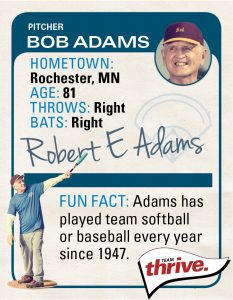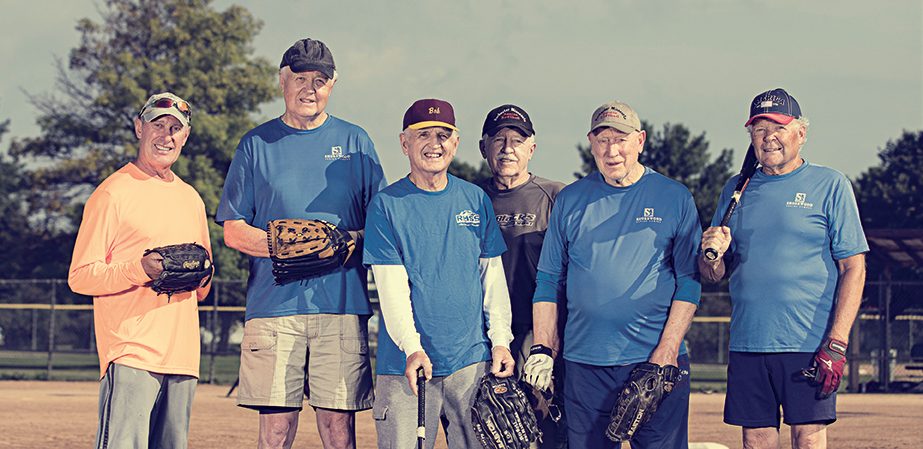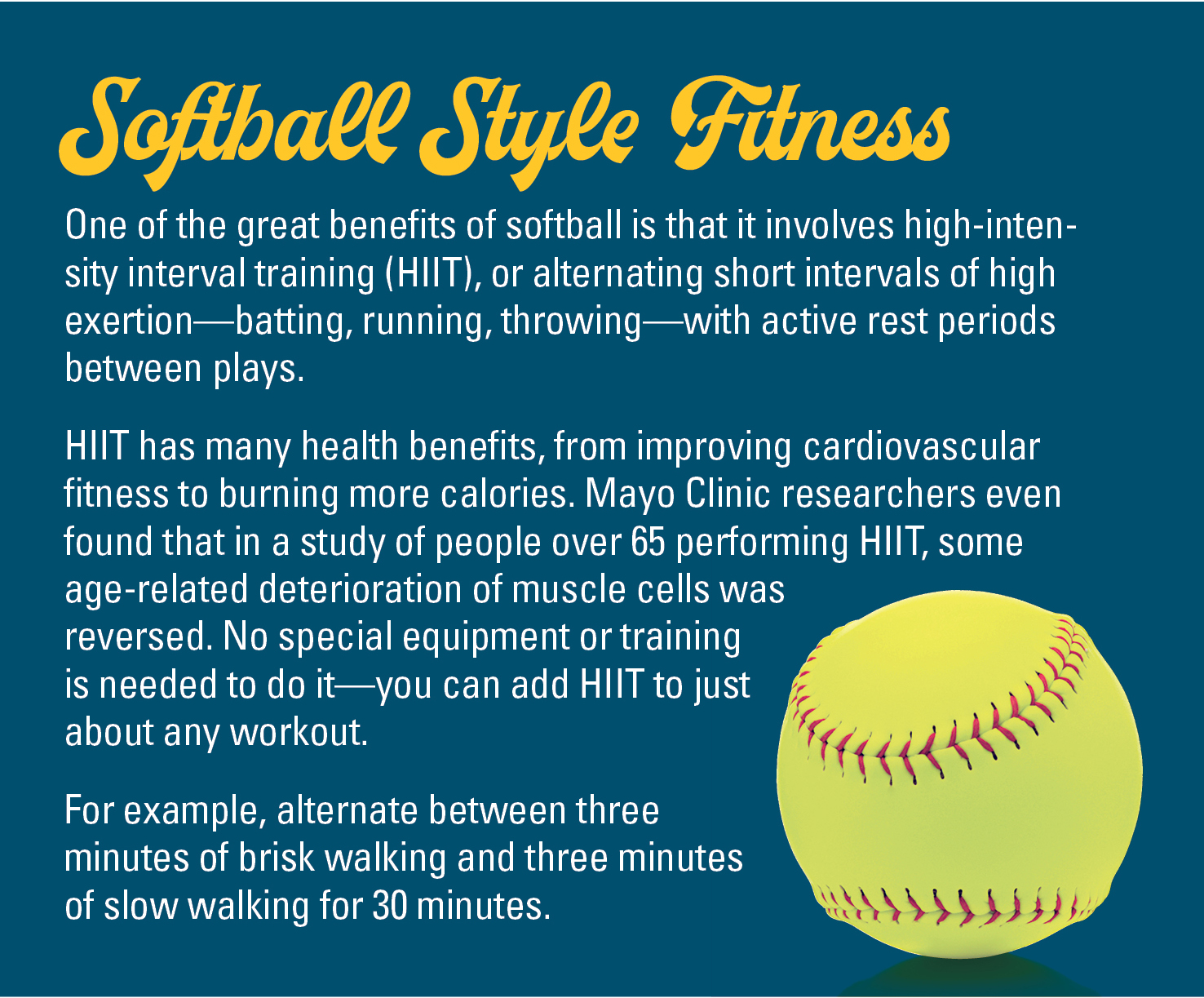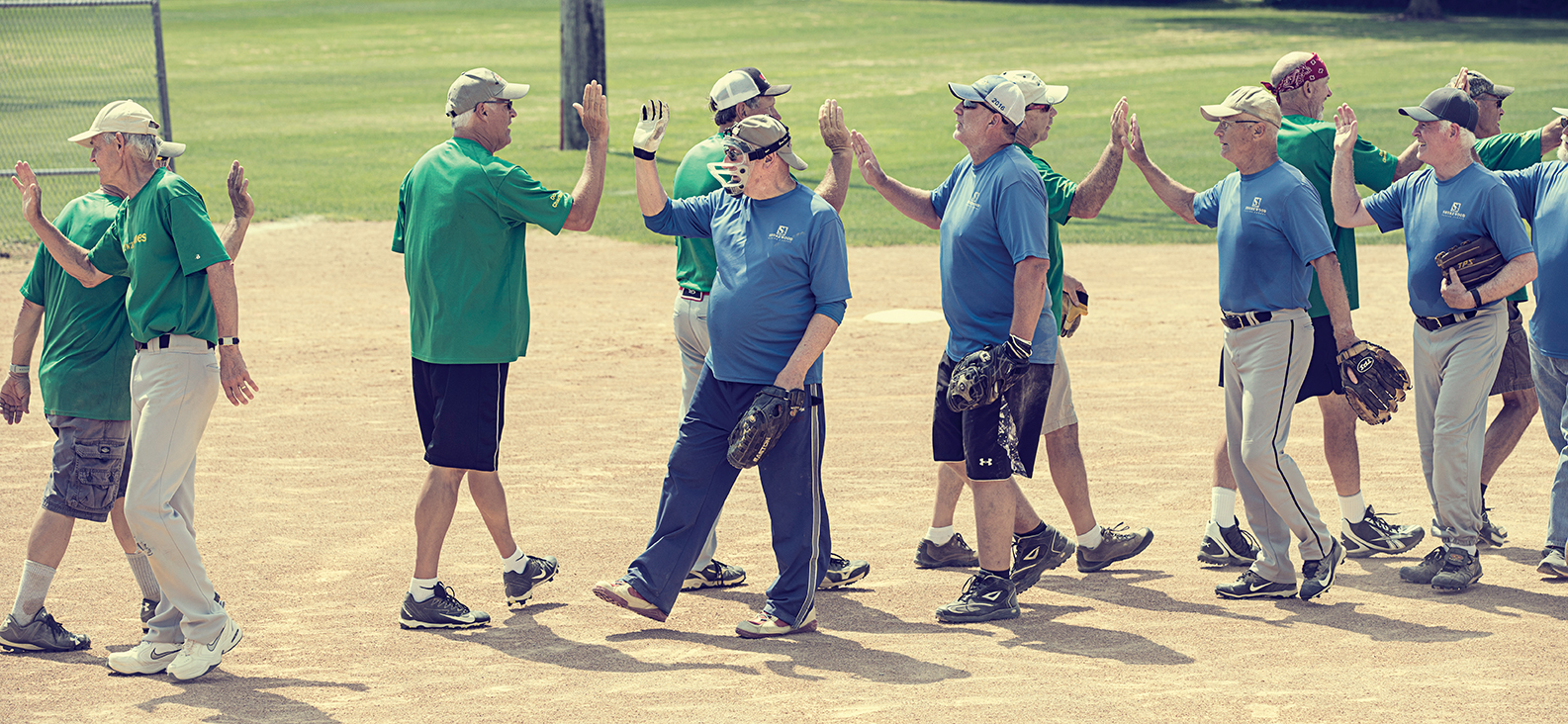Home run for physical and mental health
April 11, 2019On a steamy summer morning at McQuillan Fields in Rochester, Bob Adams took to the mound to defend his team’s two-run lead in the bottom of the ninth inning.
Adams’ Shorewood Club had just gone up by two after Team Edward Jones rallied with eight runs in the eighth. Adams and catcher Larry “Cue Ball” Batterson, who have 164 years of age between them, shut that comeback down after three batters to leave the field with an 18-16 win.
 “You never get old as long as you’re playing,” Adams says with a smile after the game. “When you stop playing, that’s when you get old. Out here, I’m not 81. I’m the pitcher on this team. My age has nothing to do with it. I’m going to give you my best game.”
“You never get old as long as you’re playing,” Adams says with a smile after the game. “When you stop playing, that’s when you get old. Out here, I’m not 81. I’m the pitcher on this team. My age has nothing to do with it. I’m going to give you my best game.”
Adams is one of roughly 120 participants in the Rochester Senior Softball League, founded in 2007 with the goal of providing fun, fitness and fellowship for older adults in Southeastern Minnesota. Many of the players are 65 and older, with a handful still playing in their 80s.
The league, which hosts games April through September, promotes safety by encouraging pregame stretching and warming up, and operates under rules like playing two innings at a time to limit running on and off the field, using a phantom home base line to eliminate collisions, and allowing designated runners for batters. The exercise is what you make it, but for most players it’s still a workout.

Staying in shape
That workout has helped the players to both physically and mentally get through a variety of issues, from arthritis to bad knees to recovering from more serious conditions like strokes and even cancer.
Adams has experienced his own share of health issues, but always comes back to softball to recover and stay fit.
“I’ve had a bad back through most of my life, but I just get up and get going and when I’m playing I feel better,” he says. “When you aren’t doing anything, that’s when you’re going downhill.”
Myriad health benefits
Dr. Heather Bergeson, a sports medicine physician at TRIA Orthopaedic Center, says group activities like softball provide a wide range of benefits from staving off chronic conditions to maintaining a healthy weight to boosting social wellness and reducing stress.
“Exercise and connecting with others are probably the two things that will extend our lives the longest,” she says.
Bergeson says physical activity is recommended for overcoming a variety of chronic conditions, though it’s important for any individual interested in taking up a new exercise to first consult with their doctor. There’s an athlete in everyone, she says, but finding a sport that is both enjoyable and compatible with your ability is important.
 “Every muscle is getting work because you have overhand throwing, running and working your core,” Bergeson says.
“Every muscle is getting work because you have overhand throwing, running and working your core,” Bergeson says.
Before playing, she recommends a “dynamic warmup” that includes full-body stretching, light jogging or walking, practice throws and practice swings of the bat. The most common softball injuries she sees are from a lack of preparation.
In addition, staying hydrated is also important, as is wearing proper clothing and protective equipment.
Softball, for example, can provide great overall body exercise, strengthening bones and muscles while also improving heart health and more.
Making connections
The league’s season is split into four 10-game sessions, with new teams drafted for each session. That prevents any one team from dominating (or struggling) and gives players an opportunity to meet new people.
“You can just see the camaraderie after every game,” says Ben Borgen, 74, who has been a part of the league since its start and, like many others, has played softball or baseball in one way or another since childhood. “Tons of friendships and a few marriages have occurred because of being here.”

Lois Douglas, 81, one of five women in the league, says it offers her an opportunity to socialize, meet new people and reconnect with old friends from her community.
While talking at league potluck, Douglas pointed out Dave Anderson, 69, who was her children’s science teacher. Anderson, who also coached baseball, says he feels grateful to be able to “extend his Little League career” as an adult.
“The reality is, when you’re retired, it’s nice to be able to go someplace where you can talk to people,” Anderson says. “It’s been a surprise and I’m sure the other guys feel the same way, to just have the opportunity to play.”
Editor’s note: The full version of this article first appeared in the Fall 2018 edition of thrive., a healthy living newsletter for Blue Cross Medicare members.

